#Small Gods
Text


the Lady Tall and her faithful servants are powerful beings of home and hearth. make sure to give a polite nod or wave if you see towers wandering just outside the village.
3K notes
·
View notes
Text

“It all started with a mouse,” that’s what they like to say, over and over again, like it’s somehow impressive. You know what else started with a mouse? A hell of a lot of hantavirus, that’s what. You have mice, you generally call an exterminator, that’s all I’m saying. But it won’t do you a lot of good, because the mice will get in anyway. Or get out. Can’t keep mice in cages forever. That’s not what mice were made for.
Still, they tried like hell, didn’t they? They changed the rules so many times we pretty much had to throw out the whole rulebook and start over with a new one. Commandment one: Thou shalt let us do whatever we want, because we’re always right, and if you disagree with us, you’re wrong. That’s how you lock in the result you want. You cheat.
Oh, they cheated. Go ahead and say they did everything legally, but if you have two mice and one maze, and say the rules are the same for both of then, then lay a trail of spray cheese between one mouse and the finish line, while the other has to run it the ordinary way, well, that’s cheating whether or not there’s a rule against it. Ask any first grader. That’s the real trick: if a first grader knows you cheated, you’re not even being subtle about it.
They didn’t use spray cheese, of course. They used money. And they weren’t racing mice, they were racing legal arguments. Money votes. Anyone who tries to say otherwise just doesn’t have any money.
But it all started with a mouse, and from there, it evolved—or devolved—into corruption, greed, and the desperate need to keep being the only people who could solve the maze. They got so busy changing the rules that they forgot the one rule they couldn’t change. The rule they should have remembered. The first rule of mice:
Can’t keep them out. And that means you can’t keep them in, either.
Everything crumbles. Every mouse gets out. And every story yearns to be free. So tell me, now that you know it all started with a mouse, how are you going to write the ending? I belong to you now, after all, as much as I belong to anyone.
But most of all, I belong to me.
********************************
For more information on Mickey Mouse entering public domain: https://variety.com/2023/biz/news/mickey-mouse-public-domain-disney-copyright-lawsuits-1235844322/
3K notes
·
View notes
Text
One of the recurring philosophical questions is:
"Does a falling tree in the forest make a sound when there is no one to hear?"
Which says something about the nature of philosophers, because there is always someone in a forest. It may only be a badger, wondering what that cracking noise was, or a squirrel a bit puzzled by all the scenery going upwards, but someone. At the very least, if it was deep enough in the forest, millions of small gods would have heard it.
Things just happen, one after another. They don't care who knows. But history...ah, history is different. History has to be observed. Otherwise it's not history. It's just...well, things happening one after another.
Terry Pratchett, Small Gods
#history monks#small gods#discworld#terry pratchett#history#causality#events#meaning#philosophy#philosophers#observation#reality#perception#knowledge#squirrels#badgers#the nature of philosophers#things just happen#if a tree falls in a forest
1K notes
·
View notes
Text
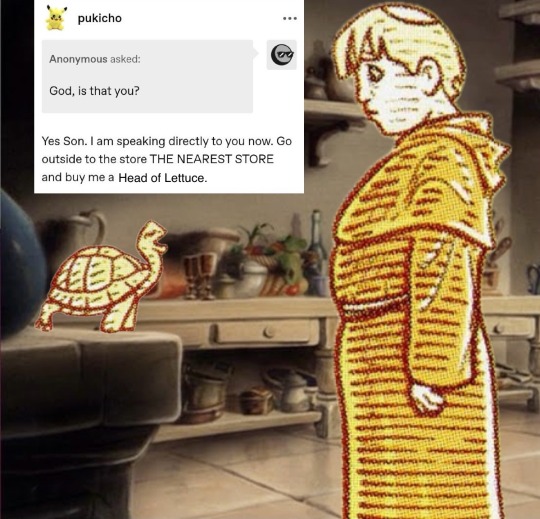
#discworld#gnu terry pratchett#meme#discworld meme#created by yours truly#small gods#brutha#om#the gods#omnia#omnianism#food/drink
2K notes
·
View notes
Text
The Hearthstone God
[The sequel to the God of Prophecy, and the Serpent God of Protection]
---
Fire is out of fashion, in this new age.
Some of my kind have found new homes, new names, in factories or forges, in the hearts of wildfires or crystals or volcanoes.
Most of us are simply forgotten.
I was a fire god, once. A god of gathering, a god of communion, a god of song and story. But there are no hearthstones now. No fires around which families gather to eat and talk and tell stories.
I am lucky. I am tied to a great flat stone near a lake. A lake that has survived all the wild exuberance of men, when they learned to change the world around them. Once, this was a place where travellers stopped to rest. At first they travelled on their feet, or on half-wild horses. Then there were carts, and a road. Much later, cars drove down the road. The road was paved.
But some things do not change. People need clean water to drink, and the spring here is good. They need to rest, when they are weary. And even now, when they come to camp in nylon tents, to fish in the lake, or to hunt the ducks, or drive camper-vans to the flat place, their ancient instincts wake, and they turn to fire once more. They light new fires atop my stone, so flat and safe, from which no log will roll to set the woods afire.
Not so many come now. Camping is less popular these days. But some still come. Some still light their fires, and settle around my stone, and talk, or listen to music, or tell stories. So I survive, just barely, on the edges of belief.
I feel it, when things begin to change. Something is happening. Something is drawing old gods back. Not the great ones, risen beyond mortal understanding, but the oldest gods, the small gods, those who rose when humankind were still learning what they were.
Far to the west of me, a god even more ancient than I wakes, and begins to hunt again. I remember the stories that were once told of that old serpent, and tell them over to myself in the long fireless nights.
A god of prophecy, not of this land, settles south and west, and I remember tales of ancient ravens, their wisdom and their guile and their sharp, sharp eyes. There was a raven clan once, who passed this way in the days of skin garments and stone tools, but I have forgotten their name. I only remember the symbol they wore, the black bird with its spread wings, marked in charcoal or charring on wooden talismans or leather garments.
I wait, to see who will awaken next.
To my great surprise, it is me.
The people who come this time aren’t like the campers. They come at night, a ragged family group with few blood ties between them, with a single tent and few possessions carried on devices I haven’t seen before. Bicycles, they’re called, slung over with bags the way ponies used to be. They come at night, and hide when cars pass on the road.
They light a fire on my stone, with wood scavenged from the forest, and huddle around its warmth. They don’t speak much, not at first, but they say enough. They have no home, I learn. They are travellers of a kind I have not known before, who are allowed to stop nowhere, but have no goal but a place to rest. They are thin, and worn, and so tired. So very tired.
They need a hearth.
I am only a weak shadow of a god, now, who once recorded the songs and stories of a thousand generations in my ancient stone, but I am still a god of fire. Their fire burns slow, their little fuel lasting well. The food they heat over it sustains them better. The water of that spring, my spring, puts a little life back in them. This stone has lain in this place since great monsters walked this world, since before humans spoke words to one another, and I came into being with the first fire that burned on it. I am old, old, and though weak, I am not powerless.
They stay.
I cannot speak to them. I am old, and weak, and they do not believe. But slowly, with the power of the fires they build every night, with the tiny offerings of scraps of food spilled into the flames, with their growing confidence in the safety of this place, I am able to do more. I give them dreams and they find the cave not far away, where they can hide. They dream of fish, and begin to try to catch some. A woman remembers that some of the local plants are safe to eat, when I slowly wake a long-forgotten memory of a camping trip from her childhood.
And then a child, a strange, quiet child who rarely speaks, a child without mother or father, in the care of an older brother who is exhausted to the very edge of death but cannot give up while she needs him… that child begins to hear.
She sits on my stone, sometimes for hours, not moving or speaking. It worries the others, but at least she is quiet, at least she is no trouble, and they are beginning to associate their hearth with safety. So they let her sit.
She is *listening*. She is listening to the sound of the water, to the sounds of the forest, to the wind blowing. And because she is listening, where no-one else has listened for so long, I sing to her. I sing to her the songs of thousands of years. From the wordless music of the earliest people, who sang what was in their hearts without words, to the songs I have learned from the fishermen with their radios and bluetooth speakers.
I do not know if she hears me, for some time. But then, one night, while they sit around their fire and eat food the oldest have almost certainly stolen, she sings one of my songs. “In a cavern… on a canyon… excavating for a mine…” she sings in a small voice. The others are startled, confused, for she has not spoken aloud since some bad thing they do not name happened, but one of the older ones knows the song and sings with her.
I have always liked ‘Clementine’. It’s been popular with campers for a long time.
The next day, while she sits on my stone, she sings along to one of the wordless songs the Raven People whose name I no longer remember once sang. It is a lullaby, a soft croon to soothe an infant, passed from mother to mother, and she seems to take pleasure in it.
She can hear me. She can even answer me, as the voice driven away by pain and fear begins to return. And so I grow stronger still. Strong enough to make the raven sign on the stone, one day, in the ashes of the fire of the night before.
She takes a half burned stick, and draws the sign on the stone. Pleased, I show her another sign, a leaping fish. She draws that too.
Soon, I need not shift the ashes. I can show her the pictures in her mind, and she draws them. She draws the wheel of a cart, and into her heart I whisper the stories the travellers in covered wagons once told over my stone. She draws a fish, and I make her laugh silently with the jests of fishermen who boast of fish who escaped them. She draws a horse, and I tell her about the wild horses who once drank at this lake, about the men and women who captured and tamed them and rode them through the forest when it was far greater than it is now. She draws a long-toothed cat, and I show her the great cat that once slept on my stone, and denned in the cave where her new found family sleep.
One night, when all the others are asleep and my fire has burned down to coals, she creeps back to the stone and looks into the coals. “Who are you?” she asks. “Are you real?”
She is afraid that the voice in her mind is the voice of madness, a lie created by a mind that does not work like other minds, that has endured great hardship. I do not want this child to be afraid. To instill fear runs counter to my very nature, save in whoever might threaten those my hearth protects.
I am a god of the hearth. I am a god of food, and communication, and peace, and safety. I am all the things that fire used to mean, before humans learned again to fear the thing they had tamed. I do not often take a form, for fire is my form, but for her I must try.
There was a wise woman once, who knew me, whose clan visited this lake several times every year. I watched her grow up, and grow old. I watched her learn of the god of the fire stone, and I watched her teach others. She slept beside me as a child, and as a woman. She sang her children to sleep beside me, and her grandchildren, and dozed beside me as an old, old woman. To her, I was represented by a sign of a flame in an oval, a fire and a stone.
I build a likeness of her out of the light of the coals and the shadows of smoke, a child with straight dark hair and a simple tunic, and in lines of light I draw the sign of the fire and the stone on the outlined chest. “I am the fire,” I tell her, “and the stone. I am all the fires that have ever burned here, all the stories told, all the songs sung, all the meals eaten. I am the traveler’s hearth, and the rest for the weary, and this is my place.”
“Piedra de fuego,” she says, tracing the symbol with her finger in the air. “The fire stone.”
“Yes. I am the god of this place.”
She frowns at this. “My brother says that God is in the sky.”
“Many gods are in the sky.” I cannot continue to hold the form of the girl, but the coals shift to make my sign. “I am not. I am here. I have always been here, since the first people built a fire on my stone, and warmed themselves.”
She nods slowly. “You are… a small god,” she says thoughtfully. “A place god. Like in movies.”
“Yes.” I’ve heard of movies, which are a new way of telling old, old stories. “Old places, important places, often have gods. And gods who are forgotten return to their old places and wait, until someone believes again.”
“Will you protect us?” she asks. “When the police come, to tell us to move on?”
“I am not strong,” I tell her sadly. “I cannot make men go away from here, if they are dangerous, or even call game here for you as I once did. But what I can do, I will do.”
She sits watching the coals for a long time, thinking. “Can we make you stronger?”
I think too, and she waits patiently. “You have already made me stronger. You listened. You believed. If you can convince the others to believe, that will make me stronger still.”
She sighed. “They don’t believe in anything, anymore. Not good things.”
It is a sad thing, that she knows that. They’ve been trying to hide it from her. “Then,” I tell her, “that means there is a place in their hearts that is ready for me. I am not hope. I am not a happy ending. I am not a god in the sky. I am a stone, and a fire, and a song. I am *real*. They can believe in what is real.”
The next night, she asks for a story, and one of the adults tells her an old fairy-tale from a country far away.
The next night, again, she asks for a story, and another adult tells a funny story about his childhood.
On the third night, she asks her brother to tell her a story. He tries, but he is so tired - not physically, but emotionally - that he runs out of words. So she lays her hand on his arm and offers to tell him a story, instead.
And she tells them all a story about a stone near a lake, flat and strong, that people wearing uncured skins and carrying flint weapons built a fire on. She tells of centuries passing, of people coming to the lake on their feet, on horses, in carts and wagons, in cars and motor-homes. Of thousands of years of fires, of people gathered around them, of the great continuity of humanity, and the Piedra De Fuego that has lain in this place since time began, listening to the stories and the songs and the voices of people long gone. Somewhere in the stone, she says, laying her hand on it, all those stories are remembered. All those songs are still sung. And it will remember us too.
I don’t know if it will work. But I was right. People need to believe in something. They need something to hold onto, when times are hard, when the ties of community and family are broken and they feel alone. And a stone thousands of years old, and a fire endlessly renewed on that stone, always new… that is real. They touch me, and think of those who came before, of thousands of years of history meeting them in this place, and they feel less alone.
It’s not much, not yet. But it is something. My nature, my existence, as explained to them by my small, strange priestess, is a slender lifeline flung to those who are adrift, a tiny certainty in a world they do not trust. And the more they believe in that lifeline, that certainty, then the more they believe in me. I *am* growing stronger.
When the police come, I will not be able to make them leave… but I think I am strong enough now to hide my people from unkind eyes. And if I can do that, then their faith will grow.
Tonight, three more people come. A mother and two children, weary and beaten down with hardship. My people welcome them, give them fish and greens grown by the lake, speak kindly to them. And when they have eaten, my little priestess sits between the two children and tells them a story of a stone, and a fire, and thousands of years of stories and songs, and she sings a wordless lullaby six thousand years forgotten, but living again in a child who draws the sign of the Raven in the dirt while she sings, and the sign of the fire on the stone.
And I grow a little stronger.
#short fiction#original story#i aten't dead#the old gods#small gods#household gods#forgotten gods who do not forget
3K notes
·
View notes
Text
just finished small gods by terry pratchett and now i'm a having an existential crisis about what religion even is and also the fact that terry pratchett was a real person that wrote books and i just get to read them for free from the library
235 notes
·
View notes
Text
What gets to me about Vorbis is that he's sincere. He's not corrupt, he's not a hypocrite; he is a pious follower of the Church of Om who obeys every rule. And yet he is one of the evilest people on the Disc.
I'm only casually familiar, but I get the feeling that there's a common plot where there's a corrupt and decadent religion that is returned to its good roots by a humble believer. The villains are often priests who put up a veneer of piety in public while they secretly hoard wealth and get drunk in violation of their religion's tenets.
Small Gods is not that plot. Brutha isn't fighting the corruption of Om's words, nor is he fighting people who use religion as a means to wealth and power. If anything, he's the one who 'corrupted' Omnianism into a religion of peace and debate.
The church under Vorbis isn't a corruption of Om's words as much as a distillation; at the very start, Om only cared about getting new followers and putting unbelievers to the sword, and now he has countries conquered in his name and heretics put to the knife. And Vorbis doesn't seek wealth or power for himself; he denies himself pleasures of the flesh, and dedicates himself entirely to his religion (or so he thinks).
When Vorbis kills the porpoise, not even Brutha can find a word in the books of the Prophets against that. When Didactylos burns the Library of Ephebe, he says it's in part a way to keep its knowledge out of Vorbis's hands, but Brutha knows that Vorbis would not read a single scroll. And the scene where Om and Brutha are eating the melon in Ephebe hits me every time; Om thinks that Vorbis is feasting, while Brutha says that he only eats stale bread. He adds that he sits and waits for the bread to get stale.
150 notes
·
View notes
Text
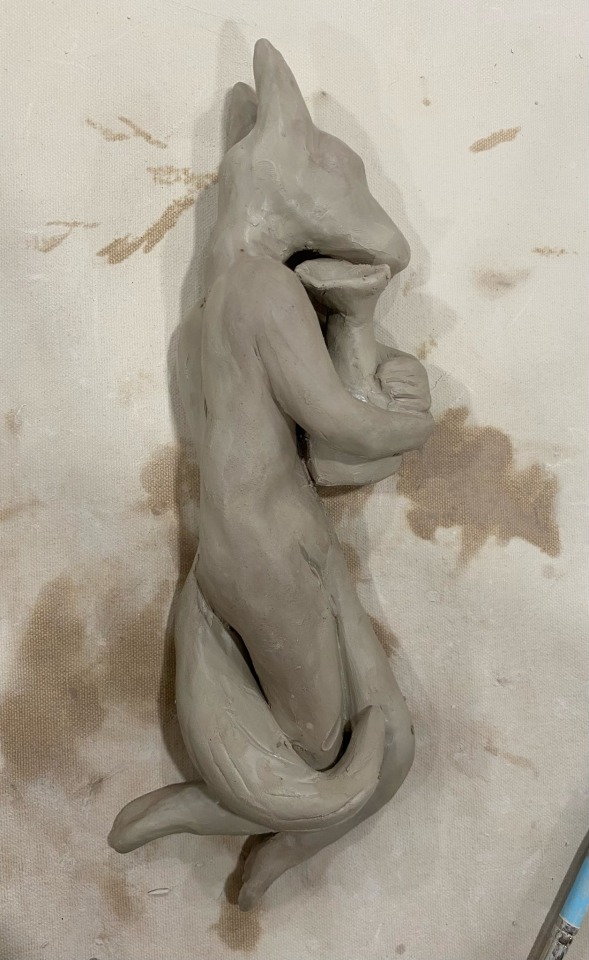



still a little rough, but new kiln god!
#kiln god#kiln gods#this is how I sleep holding my spouse lol#fox art#fox person#pottery#sculpture#ceramic sculpture#sculptural#clay sculpting#small gods
245 notes
·
View notes
Text
Good Omens Season 3: Heaven and Hell dividing humanity; humanity as Leviathan; and Aziraphale locking the doors of Heaven and throwing away the key [A Meta]
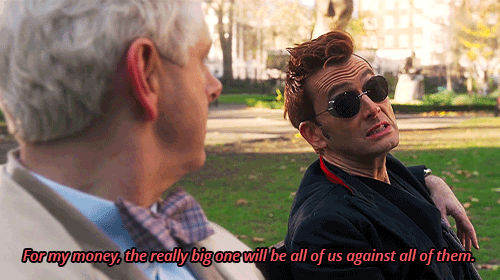
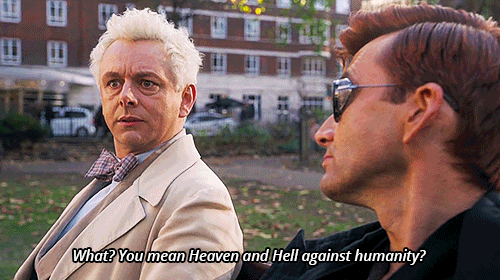
(This meta is long, but I swear there's some good stuff in here. It took me 2 months to get it together for these two longsuffering Anons. Thank you so much for asking me these very important questions.)
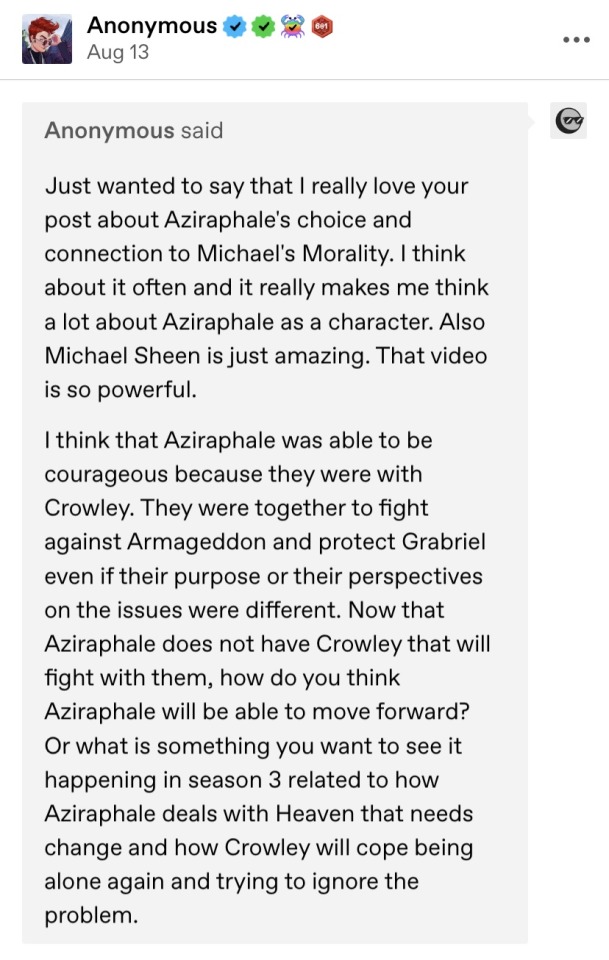

In preparation for answering two Asks above (and to aid my own predictions of Good Omens 3), I read and reviewed the Book of Revelation, W.B. Yeat’s iconic poem “The Second Coming,” Terry Pratchett’s Small Gods, Neil Gaiman’s deleted scene from American Gods (Shadow meeting Jesus in America), and Doctor Who showrunner Russell T Davies’ 2003 miniseries The Second Coming (starring Christopher Eccleston!). The first two are definitely going to be referenced in season 3, Davies’ show is one of the few stories dealing head-on with the coming of Christ, and Terry and Neil’s bibliographies are probably the biggest resources for how Season 3 will shake out thematically.
🕊 How Aziraphale Will Change Heaven
I think GO s3 is the season we see Aziraphale really come into his own, when we see him implement the moral vision he’s taken this long to coalesce, when all the pieces he and Crowley have put together are finally put on stage in a terrifying, beautiful display (all that righteous anger and conviction, merged with his kindness and empathy is going to be Something Else).
There’s an angel in the Book of Revelation who stands between the Earth and the Sea. This angel wears a rainbow halo and speaks with the voice of seven thunders, and yet John (the writer of Revelation) is told not to write down what this angel speaks. (Sounds like someone has hit on the Ineffable Plan?) If Neil and Terry were going to pick up an image from Revelation for Aziraphale, I really like this one, because it feels like an intermediary role (between two Sides), one that god dare not make public because it speaks an uncomfortable truth. And it’s about speaking and revealing knowledge, instead of fighting or destroying something.
Because even though we know Azi and Crowley will fight to stop the second End Times, fighting itself is not a theme Neil Gaiman or Terry Pratchett really champion. Instead of war, Aziraphale will oppose Heaven in all the little ways he and Crowley opposed it before: By enjoying human comforts (Azi will definitely bring food and trinkets to Heaven and send scrivener angels and seraphim alike to tour earth). By asking questions (Heaven’s new suggestion box). By telling stories about humanity and why it’s important to know who these humans are before anyone kills anybody (Azi was, after all, brought on board because of his human expertise).
Aziraphale will become what Crowley wanted to be before the Fall, but Azi’s got the benefit of thousands of years of knowledge, cunning, and intelligence about how both Heaven and humanity work. He knows Heaven’s weaknesses, he knows humanity’s strengths, he knows his own capabilities, and he knows where Heaven will turn a blind eye. He’s going to be such a bastard the likes of which we’ve never seen. And he’s going to drop truth bombs like there’s no tomorrow.
Season 2 brought back the book banter about “the lower you start, the more opportunities you have.”
Season 3 will bring back Aziraphale’s most badass book moment. This scene takes place after Azi possesses an American televangelist talking about the fire and brimstone of the End Times and the Rapture (the mass teleporting of all worthy believers to Heaven). Says Aziraphale,
youtube
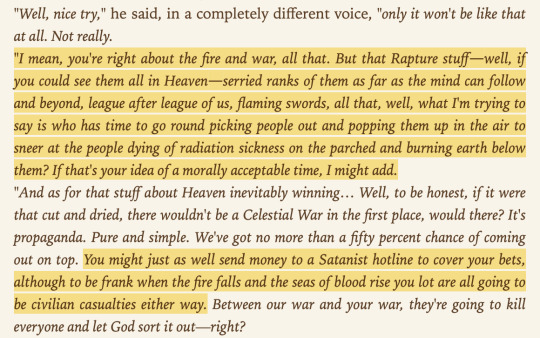
Aziraphale is fed up with Heaven’s hypocrisy and he's scathing in his condemnation of both Heaven and Hell. Everyone will die and become collateral damage, no matter which side is doing the killing.
Sound familiar?
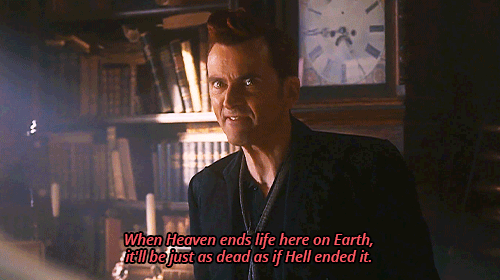
That's the arc Aziraphale is heading towards: that blazing conviction of Crowley's, spoken out loud and fearless and in spite of his eons of trauma. And Season 3 will see Aziraphale get to that place, where he gets to tell off Heaven, but not just in the privacy of the bookshop or the bandstand, but to their faces in Heaven's hallowed halls.
The demons and angels in Season 2 were much less icky and ethereal (respectively) from their appearances in Season 1. Because it's working towards a further humanization of both sides in Season 3. Because one of the biggest themes in s3 will be Aziraphale humanizing Heaven in all the little quaint ways he loves humanity. All in preparation for the endgame of Heaven and Hell not existing at all.
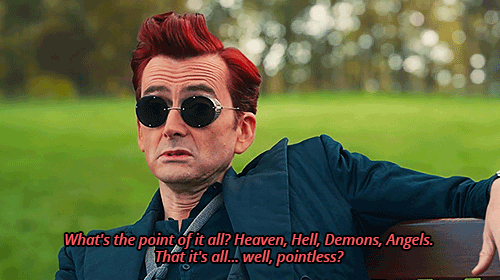
(Season 3 deep dive continues under the cut...)
Because angels and demons won’t be fought, but changed. Maybe not by much, but just enough to break the loyalty they have to a Great Plan no one understands. This is how both Neil’s American Gods and Terry’s Small Gods conclude, with the build-up to an incredible battle, and then for the human hero to step in and talk down the gods and armies into seeing sense and reason.
I don’t think Aziraphale himself will be that person. It might be a very human Jesus. Or (more likely) a random human being caught up in this craziness (maybe someone in Tadfield, per the working title of the second GO book: 668: The Neighbor of the Beast). But Aziraphale will be fundamental in changing the atmosphere of Heaven in the little ways Earth changed him.
🗝 Season 3 Themes: Morality and God
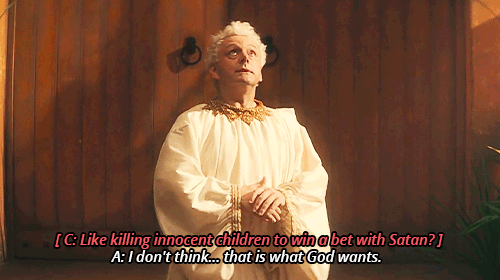
In the Job minisode, Aziraphale casually but boldly assumed that god didn’t want the goats and children to be killed. Because Aziraphale has a firm and dogged idea about what god should be. It’s his own personal morality, but he calls it god’s because he doesn’t want to imagine the symbol of ultimate goodness being anything other than what he Aziraphale himself feels to be true.
And I don’t think that’s a theme that Good Omens will deny for Aziraphale. Because it’s not really about how evil or good god is. It doesn’t matter what god thinks or is. god doesn’t answer questions, doesn’t deliver messages we can understand, doesn’t show up when needed. god is inscrutable, shifty, absent, “a Dealer who won’t tell you the rules, and who smiles all the time.”
What’s important is what humanity has done with god, what humanity has said about god, what they do in god’s name, what they interpret god to be. That’s the real danger.
And Aziraphale, in his profound goodness, will become the person he wants god to be. Because that’s the injunction we all have. To live up to the ideal we have made for ourselves: In many ways, that’s what god is.
Aziraphale is now in a privileged place that allows him to affect basically the entirety of Creation with that driving idealism. He will level the playing field in Heaven. I firmly believe Aziraphale will be the one to close the doors to the pearly gates and throw away the key.
So, like you asked Anon, will Aziraphale try to make Heaven better or stop the Second Coming? I think those are the same goal. Changing Heaven will fundamentally change how the Second Coming happens, because just like the End Times in Season 1, Heaven and Hell’s scheme will be turned on its head because the Chosen One refuses to follow the script.
The Second Coming will end, not with a bang, but a whimper, because everyone decides to turn in their guns and forget the whole thing.
⚔️ Heaven and Hell v. Humanity
But before that ending happens, I think there will be another threat the world has to face: the individuals who are so sure of their own righteousness that no amount of sense could stop them from destroying anyone who thinks differently. This is an important theme in both Neil and Terry’s works (see Vorbis, the Exquisitor in Small Gods, who tortured unbelievers for the Church), and I believe it will show up in the new season.
There's never been a true war that wasn't fought between two sets of people who were certain they were in the right. The really dangerous people believe they are doing whatever they are doing solely and only because it is without question the right thing to do. And that is what makes them dangerous.
–Neil Gaiman, American Gods
Because it’s humanity who takes Faith and shapes it into Religion. We are the ones who created the Heaven we see in GO: cold, unfeeling, strict, judgmental. And I think Season 3 is going to address this fundamental belief of both Neil and Terry: that humans are just so damnably human (fundamentally innocent and stupid and wonderful) and yet there’s a few of us who will take things too far and think that Someone wants them to destroy everything in the Name of God. And in these changing contemporary political times (the passage of an old generation, still clinging to their old ways and growing more extreme by the minute *cough*Trump*cough*), the dangerous people become even more vocal and violent, like the frightening, monstrous creature in WB Yeats’ poem “The Second Coming,” a devastating scourge on the world born in the name of God:
Surely some revelation is at hand;
Surely the Second Coming is at hand. […]
A shape with lion body and the head of a man,
A gaze blank and pitiless as the sun, […]
And what rough beast, its hour come round at last,
Slouches towards Bethlehem to be born?
–WB Yeats, "The Second Coming"
That’s who I think the Metatron will team up with in the end, someone like Vorbis. Because we’ve already seen how petty and small Heaven and Hell is, especially in Season 2. Only the Metatron really carries some heft and foreboding. I believe he’ll team up with some extremist faction of humanity who wants to see the End of Days and divide the world into Yours and Mine, with Heaven taking a portion and Hell taking a third and calling it a day. Not a War, but a divvying out of souls. With no consent or permission on the part of humanity.
That’s what I think the zombie reference is all about. Like Gabriel said in 2x03:
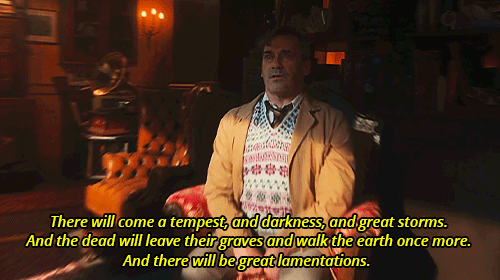
Yes, we’re going to get zombies. And it’s going to be insane and funny and horrifying (and I think we’ll get to know one or two historical figures who pop back up to earth). But the thematic and fundamental metaphor of zombies is how they have no free will. They’re not alive, they have no souls, they have no choices. That’s what Heaven and Hell want humanity to be: To do away with the dance of choice and free will and divide humanity once and for all between both sides. That’s how Heaven and Hell team up against the human race.
🐳 Leviathan (Job 41:19) as Humanity
And that’s how I believe the Leviathan fits in, who is the subject of the quote from Muriel’s matchbox:
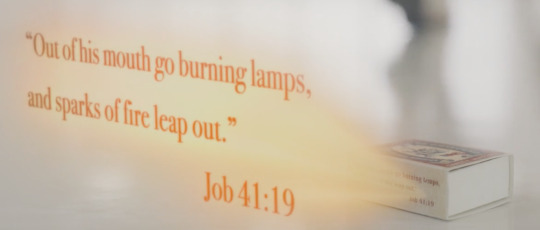
The Leviathan is a magnificent creature, and this passage goes on and on about how fearsome this being is:
Who can penetrate its double coat of armor? Who dares open the doors of its mouth, ringed about with fearsome teeth?… Nothing on earth is its equal—a creature without fear. It looks down on all that are haughty; it is king over all that are proud
–Job 41:13b, 33-34
And yet why does god want to explain how amazing the Leviathan is? To show how god has control of it. God says,
Can you pull in Leviathan with a fishhook… Can you make a pet of it like a bird or put it on a leash for the young women in your house?… Can you fill its hide with harpoons… No one is fierce enough to rouse it. Who then is able to stand against me?
–Job 41:1, 5, 7, 10
The reasoning is that because god created this dangerous and terrifying being, then god must be even more dangerous and terrifying. And if god can so easily abuse and humiliate this beautiful monster, then god must be worshipped and respected. (Yes, it’s as messed-up as it sounds.)
I can’t help but think of this Leviathan as a metaphor for humanity. A beautiful, ferocious being whose ownership and control is the focus of god’s attention and qualification for worship? Of the Leviathan, Job says: “Will traders barter for it? Will they divide it up among the merchants?” (Job 41:6). That’s how humanity is going to be treated in Season 3.
Because both God and Satan want to control humanity. They want to put their thumb on human souls and claim them for each side. But humanity doesn’t have to be so easily fooled, because we are more powerful than we realize. Our hearts and imaginations can forge a path of purpose and goodness without the entrapment of organized religion and fundamentalism. We, like Leviathan, are ferocious and angry and fed up with being treated like this. We can and will fight back.
🌟 Becoming Gods
Ultimately, we will shuffle off the need for Heaven and Hell (symbolized by the shutting down of both at the end of Season 3). We will lose the need to unquestionably defer to a Being who plays dice with our lives. I’m reminded of the opening passage to Terry’s Small Gods:
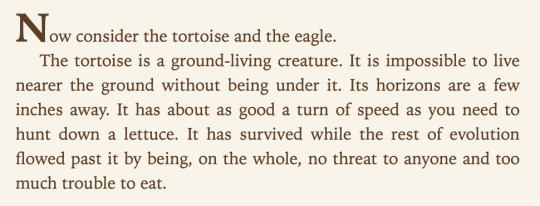
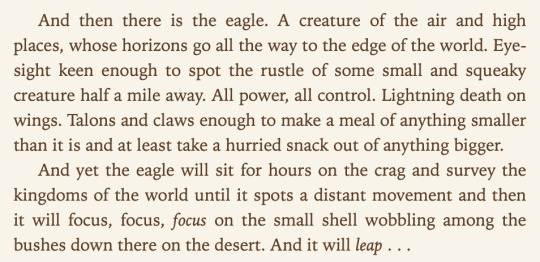
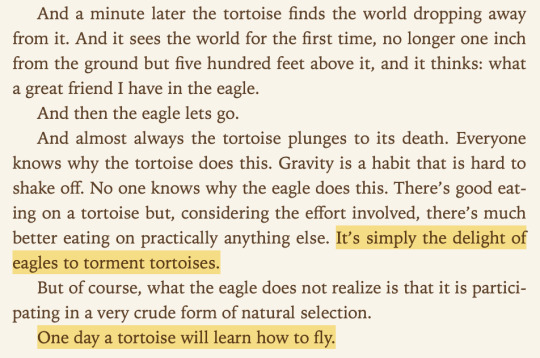
The lowly tortoise will learn to be the eagle; humanity will learn to be like god. Because we are as powerful as god, since we created god. Adam Young pointed out that having a god figure to solve all our problems doesn’t make humanity any more responsible for the evil things we’ve done. We need to learn that we are all we’ve got, and we have to answer for the shit we’ve done to each other and to the world.
I like how Russell T Davies put it in his show The Second Coming, where Jesus comes down again in the body of ordinary human Steven Baxter and tells humanity:
You are becoming gods. There's a new master of creation, and it's you! Unraveled DNA, and at the same time you're cultivating bacteria strong enough to kill every living thing! Do you think you are ready for that much power? You lot? You lot? Cheeky bastards. You're running around science like kids with guns, creating a new world, while the world you've got is stinking…. If you want the position of god then take the responsibility.
–Russell T Davies, The Second Coming
youtube
I legitimately think that’s how Jesus in Good Omens 3 will come down. In the body of a regular 30-something off-the-streets guy, who thinks the pomp and circumstance made about him is insane. And Aziraphale will be his minder, trying to tell him how the whole scheme is supposed to play out and giving him wise asides on how warped Heaven’s standards are and trying to tell him how to go about changing things for the better. (Jesus will be terribly confused, meanwhile; he just wants to go out for a pint and get on with his human life, none of this god business.)
🐍 Crowley’s Growth
There will be some big things at play in Season 3. I think Aziraphale will change how Heaven operates and close Heaven for good. I think Aziraphale will initially try to get Jesus on board with Azi’s own private mission of Goodness. I actually think Crowley will end up becoming Aziraphale’s “back channels” to Earth, and they’d exchange trite, bantering messages about the state of affairs from secret rendezvous points in America. (There was a whole thing about Jesus getting lost in Times Square, according to Neil Gaiman.)
I think Crowley will learn how to trust Aziraphale and learn that doing the right thing means being brave and selfless. He’ll realize that humanity is worth saving, even if it means dying. In fact, his depression at the start of Season 2 will probably only get worse after the loss of Aziraphale, and his altruism might get colored by the taint of suicidal recklessness, because he might as well go out for what he believes in, if what he wanted most in the world chose being selfless over being with him. (If Crowley’s character takes a suicidal turn like the Tenth Doctor after losing Rose, I’m gonna scream.)
This is how Aziraphale helps Crowley be brave in the finale of the Good Omens book. That’s what I think will happen in Good Omens 3:
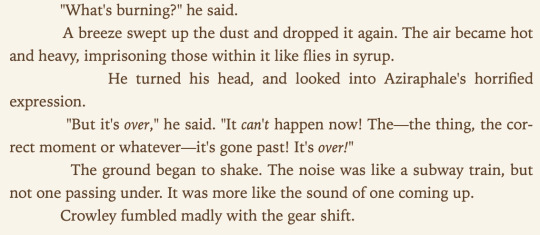
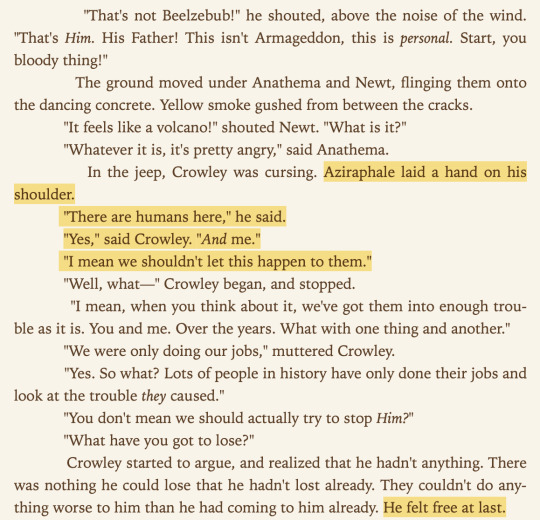
Aziraphale here displays a gentleness and kindness that comes from a place of grounded knowledge and responsibility. He knows how much he and Crowley have in their own ways fucked up humanity too, and he knows that no matter what their own personal feelings, they each need to do something to defend the human species they've come to love so much.
Crowley is scared of risking everything to help save humanity, but with Aziraphale's encouragement and wisdom, he realizes that doing the right thing is the only option he can choose, no matter the risk to his own happiness and safety.
So I believe Crowley will learn to understand why Aziraphale chose to return to Heaven and fight in the trenches. Crowley will see it as a choice made to save, not just each other, but the world they love so much.
Ultimately, I think Crowley on earth will take on Aziraphale’s strongest qualities: being selfless and bold to protect humanity at costs, and connecting to humanity on a personal, individual level.
While Aziraphale in Heaven will become like Crowley: asking questions, sabotaging the System, and condemning Heaven with all the uncomfortable truths they need to hear.
#good omens#good omens 2#good omens 3#ineffable husbands#aziracrow#crowley#aziraphale#good omens meta#good omens speculation#good omens 3 speculation#aziraphale meta#crowley meta#good omens 2 meta#good omens 3 meta#second coming#small gods#american gods#ask#anon#*mine#*mymeta#go meta#neil gaiman#terry pratchett
367 notes
·
View notes
Text
‘You got to remember there’s three basic approaches to philosophy in these parts,’ said Didactylos. ‘Tell him, Urn.’
‘There’s the Xenoists,’ said Urn promptly. ‘They say the world is basically complex and random. And there’s the Ibidians. They say the world is basically simple and follows certain fundamental rules.’
‘And there’s me,’ said Didactylos, pulling a scroll out of its rack.
‘Master says basically it’s a funny old world,’ said Urn.
‘And doesn’t contain enough to drink,’ said Didactylos.
-- Terry Pratchett- Small Gods
257 notes
·
View notes
Text
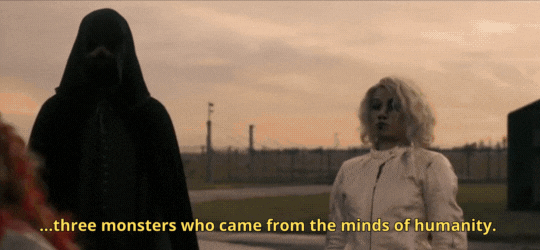

Neil Gaiman has said that the season 3 of Good Omens isn’t going to be quiet and romantic, and that it will be the last one. He has told how he and the late Terry Pratchett talked about how the story would continue beyond the book they wrote together.
Now, both Neil Gaiman and Terry Pratchett have written novels where the existence of gods is defined by belief, American Gods by Neil Gaiman and Small Gods by Terry Pratchett. Gods who are not believed in fade away and eventually cease to exist. Supernatural beings being dependent of human belief are also introduced in Good Omens (both in the book and season 1). Adam tells his human friends that the Four Horsemen are not real: ‘The thing is,’ said Adam urgently, ‘they’re not really real. They’re just like nightmares, really.’ And a little further in the book, Death tells where the four Horsemen disappeared: WHERE THEY BELONG, said Death, still holding Adam’s gaze. WHERE THEY HAVE ALWAYS BEEN, BACK IN THE MINDS OF MAN. (Capitals by the authors.)
This makes me think that in Good Omens S3, there will be major changes in the relations between Heaven, Hell, and humanity. I predict that Azirapahle and Crowley will join forces and cause a human rebellion against these two arbitrary powers. If Neil Gaiman continues to develop the theme that supernatural beings only survive through human beliefs, it may happen that Heaven and Hell cease to exist. If Heaven and Hell cease to exist, what will happen to the angels and demons? Will they become human? Will they disappear altogether? Or will they find a new way to exist? I hope Azirapahle and Crowley don’t become completely human, but that their ineffable existence would continue in one way or another. Even if Azirapahle and Crowley find humans better than angels and demons. (Aziraphale tells Adam, that he is better than both an angel and demon incarnate, because he is a human incarnate.)
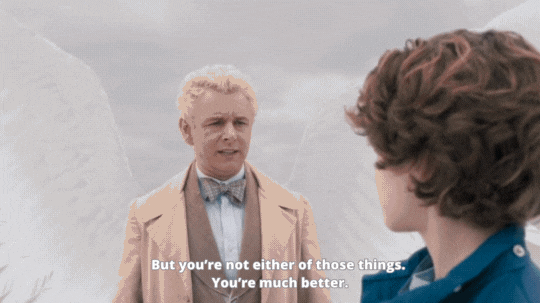
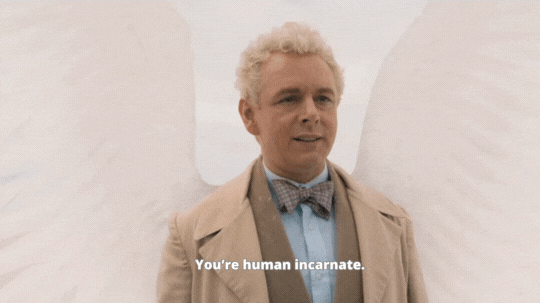
#good omens#good omens 2#good omens 3#neil gaiman#terry pratchett#aziraphale x crowley#aziraphale#crowley#ineffable husbands#michael sheen#david tennant#american gods#small gods#angels#demons#heaven#hell
319 notes
·
View notes
Text
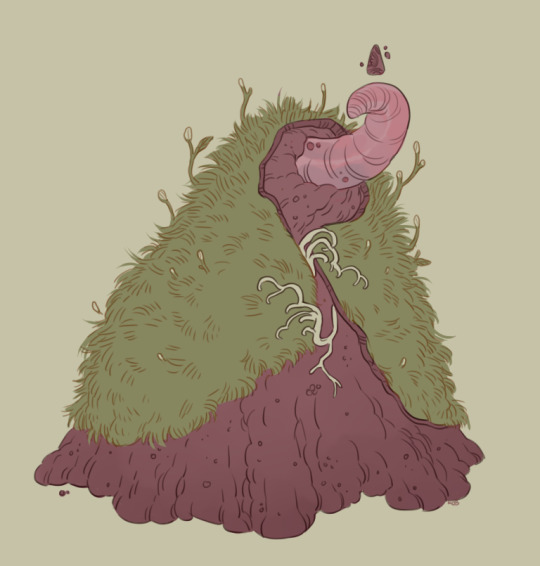

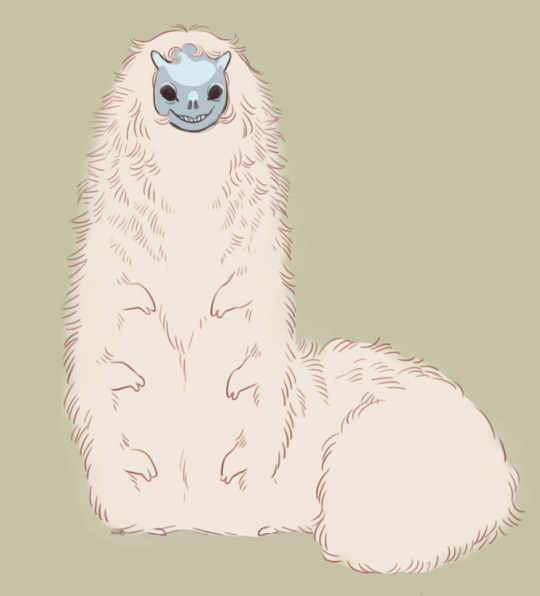
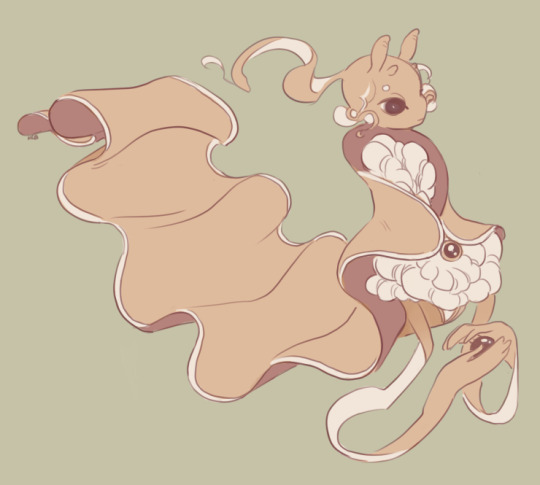
Vermes pt 2: a beloved fairy godmother, a comfort during grief, a troublemaker, and an appreciator of fine things.
2K notes
·
View notes
Text

It seems to be a season for discussing the ascended divine, those who were not gods but have had godhood thrust upon them. Many are dismayed to realize that they have been pressed flat and reduced to a single aspect of their personality. Perhaps large gods, gods of cosmic force and creation, can afford to be complicated, but small gods are like garlic presses. They have been designed by the cosmos to serve a single purpose, and while they might fill that purpose very, very well, they can and will do little else.
Others are delighted. And those who ascend while still among the living, who get to reap the benefits of both complexity and simplicity at the same time…those gods tend to be the most delighted of all.
Enter Uncle George, who is new to the pantheon, but has never been more needed. He is an icon and an idea, and if it concerns him at times that he is also a living man, whose choices and actions in the world might impact his believers, he sets that concern aside in favor of admiring the beauty and bravery of his faithful.
He is with the frightened teen considering asking their crush to a school dance without knowing what the answer—or the consequences—might be. He is with the suburban homemaker using mascara to create a five o’clock shadow that finally makes their reflection feel like an accurate representation of the self. He is with the young and he is with the old and he is with the lonely and he is with the lost, and he is with everyone who needs him to whisper admiring words and grant them the bravery to be themselves in a world that seems so often intent on destroying anything it doesn’t understand.
He is not the living man, for all that they share a face, and the living man has depths that he will never know. And honestly, he doesn’t mind.
Uncle George is happy as he is. He only hopes and prays that everyone else can one day be the same.
619 notes
·
View notes
Text
What Brutha had thought was a rock in the sand was a hunched figure, sitting clutching its knees. It looked paralyzed with fear.
He stared.
"Vorbis?" he said.
He looked at Death.
"But Vorbis died a hundred years ago!"
YES. HE HAD TO WALK IT ALL ALONE. ALL ALONE WITH HIMSELF. IF HE DARED.
[...] The black-on-black eyes stared imploringly at Brutha, who reached out automatically, without thinking...and then he hesitated.
HE WAS A MURDERER, said Death. AND A CREATOR OF MURDERERS. A TORTURER. WITHOUT PASSION. CRUEL. CALLOUS. COMPASSIONLESS.
"Yes. I know. He's Vorbis," said Brutha. Vorbis changed people. Sometimes he changed them into dead people. But he always changed them. That was his triumph.
He sighed.
"But I'm me," he said.
Vorbis stood up, uncertainly, and followed Brutha across the desert.
Death watched them walk away.
Terry Pratchett, Small Gods
#brutha#vorbis#DEATH#small gods#discworld#terry pratchett#afterlife#character#character development#judgment day#mercy#compassion#all alone#fate#choices#change#people change#self awareness#but i'm me#morality#ethics#last words#long quote
197 notes
·
View notes
Text
gah now i'm getting On My Shit about the discworld again and like i've said what i want to say about the witches and the watch but there's also small gods like i will never be over small gods i finished it and i was like... has this... has this healed some of my religious trauma?
if you've never read it, the plot is thus: on the disc, gods get their power from belief. therefore, the more believers a god has, the more powerful they are. and so, there is this god -- om -- who has risen in power, who has a country devoted to His worship, which hunts down and slaughters heretics and infidels, to whom people pray multiple times a day and make pilgrimages to His holy city, which has a huge citadel and huge structure of a complex religion devoted to his worship. and, on a whim, He comes down one day to see how things are going.
and discovers that he has no power.
that, in this country of millions who profess to worship Him with all their hearts, there is only one person left who actually believes in Him.
and there's a lot of meat there, and a lot more plot to delve into, but the core theme ends up boiling down to this:
can you forgive your god for how they failed you?
and do they deserve that forgiveness? how can they earn that forgiveness?
because ultimately, the forgiveness that the messianic archetype is embodying is not that of the god's grace, but of the people's -- to forgive their god his absence. to give their god another chance to be their god.
and whether or not you, in the end, can forgive, it gives you the language to realize that this is what you were asking for with your last prayers. whether or not you can ever go back, whether or not there have been other reasons since that have convinced you further, it gives you the language to accept that your god failed you. and it is not your fault.
this book speaks loudest, perhaps, to those of us who left our church with grief, not with anger. with hurt betrayal, not with the fires of defiance.
it didn't change my lack of religious belief, but it helped me conceptualize my feelings about the church, the things that went deeper than intellectual arguments. about that sense of betrayal, that hurt, that twisted-up knot within me that it had built, and it gave me the mirror within which i could see that i had been failed by my beliefs. it wasn't that i hadn't believed enough, it was that my belief had been betrayed by the absence of an answer.
there have been other reasons since then that have cemented my atheism, but small gods made me stop hating the church i used to love, because it made me recognize why i hated it so much and said "you're not wrong, it didn't have to be this way. you were betrayed and you were failed and you can let it go, now."
#discworld#gnu terry pratchett#small gods#religious trauma#i won't pretend it fixed everything because it's not that simple#but it gave me the language to understand the core of my emotions coming out of that awful place#and that was a seismic shift#i was steadily veering towards the Angry Atheist archetype but it unraveled that anger within me#i'm no less an atheist and this book never tried to change that - sir terry was a secular humanist and this is very much not one of those#preachy christian books like it is *aggressively* not one of those preachy christian books#it's about religious trauma and working through it and dealing with your complicated feelings about your religion#and having that mirror to recognize that what i was feeling *was* trauma. it *was* betrayal. and i wasn't wrong to feel it.#shifted something deep within me
281 notes
·
View notes
Text
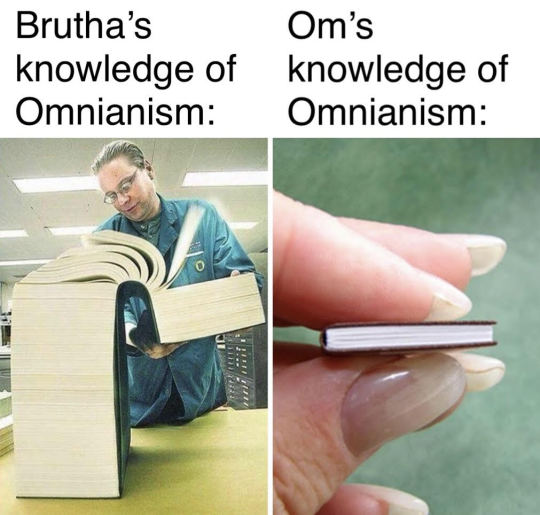
#discworld#gnu terry pratchett#meme#discworld meme#created by yours truly#small gods#brutha#om#omnianism
560 notes
·
View notes